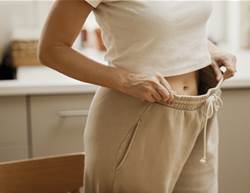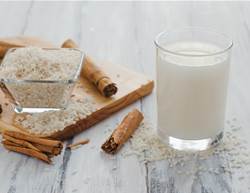Social media can be a handy place to discover weight-loss tips, healthy recipe ideas, fitness routines and other wellness hacks. One trend doing the rounds is the pink salt trick for weight loss.
Creators share slightly different versions, but the gist is the same: add Himalayan pink salt to water, with optional flavourings like lemon and honey, and drink it first thing in the morning. Influencers claim this can support weight loss, improve skin and “detox” the body, among other benefits.
“There can be benefits to adding salt to water, but context matters,” says registered dietitian Bree Phillips. “For endurance athletes or during very sweaty workouts, a small pinch may help replace what’s lost in sweat and support hydration. The key is keeping the amount small and using it strategically, not as an everyday habit.”
Along with sodium, Himalayan pink salt contains trace minerals such as magnesium, potassium and calcium, which the body uses in small amounts. Simply drinking more water—for example a glass on waking—is also linked with weight control.
As with many social media weight-loss tricks, the reality is more complicated. Here’s what dietitians say about the pink salt trend.
Note: If you have pre-existing conditions or take medicines, check with your GP before trying the pink salt trick. Salt can interact with certain medicines and may not be appropriate for everyone.
What is the pink salt trick for weight loss?
The pink salt trick involves adding Himalayan pink salt to water, sometimes with flavour add-ins such as lemon and honey. Posts often claim a long list of benefits—aiding digestion, regulating hormones and even helping to burn fat—but rarely explain how it would achieve these effects or whether it is suitable for daily use.
Does the pink salt trick work for weight loss?
“There’s no scientific evidence that Himalayan pink salt promotes weight loss,” says registered dietitian Carla Hernandez. “Pink salt works in the body like regular table salt, with a few extra minerals.”
Those extra minerals add little. “They’re like sprinkles on a cupcake—they add colour, not meaningful nutrition,” Hernandez says.
While the salt itself offers no weight-loss benefit, drinking more water is a dietitian-approved habit that can support weight management.
“Drinking more water can help mostly because it replaces sugary drinks and stops people confusing thirst with hunger,” says Hernandez. She points to a study where two groups followed an energy-reduced diet—fewer kilojoules than the body burns each day—but only one group drank 500 mL of water before each meal. The water group lost about 1.8 kg more than the group that didn’t. Another study in 2021 found that among adults aged 55 to 75, replacing drinks such as beer, spirits and dairy drinks with water was associated with less weight gain.
Phillips notes that adding lemon to water may have a small effect on digestion. One study found faster gastric emptying with lemon juice compared with plain water.
That said, lemon juice is not a magic weight-loss aid. “For weight management, it is the overall eating pattern, activity and lifestyle habits that make the difference,” Phillips says
Are there other benefits to putting Himalayan pink salt in your water?
While there is no evidence that the pink salt trick helps with weight loss, some groups may benefit from a small amount of added salt.
“For most people, plain water is all you need,” says Hernandez. “But there are times when a little extra sodium helps. Endurance athletes such as marathon runners or cyclists lose a lot of sodium in sweat. Replacing it can support hydration more efficiently, help prevent cramps and dizziness and aid performance.”
Extra salt may also help specific groups under medical guidance, she adds. Examples include people following a strict ketogenic diet, or those managing postural orthostatic tachycardia syndrome (POTS) where higher sodium intake can assist blood pressure and heart rate control.
Is the pink salt trick safe?
This trend is not safe for everyone.
“Check with your GP or healthcare professional before trying it,” says Phillips. “People with high blood pressure, kidney disease or heart conditions who need to limit sodium should avoid adding salt to drinks. Too much sodium can be harmful and individual needs vary.”
Alternatives to the pink salt trick
While the pink salt trend is largely ineffective for weight management, there are other ways you can meet your goals and make sure your body is getting what it needs to function optimally.
Choose balanced electrolytes
Sodium is not the only electrolyte the body needs. Electrolytes include sodium, potassium, calcium and magnesium, which support fluid balance and muscle and nerve function. If you need replacement after heavy sweating, use an electrolyte drink or oral rehydration solution rather than plain salt water, and watch the sodium and sugar so you are not overdoing it.
Drink more water
Staying hydrated supports weight management by replacing sugary drinks and helping prevent thirst from being mistaken for hunger. As a guide, aim for about 2.7 litres a day for women and 3.7 litres for men, though climate, activity and health conditions change needs.
Follow a balanced diet
Patterns with the strongest evidence for healthy weight include the Mediterranean style, DASH principles that emphasise lower sodium and plenty of plants, and structured time-restricted eating for some people. Ask your GP or healthcare professional to help tailor an approach that is safe and sustainable.
Bottom line: Does the pink salt trick help you lose weight?
“There is no clear evidence that adding Himalayan pink salt to morning water directly promotes weight loss,” says Phillips. For endurance athletes or people with certain medical conditions, a little extra sodium from food, electrolyte drinks or prescribed guidance may aid hydration and performance. Most people already consume more sodium than they need, so daily salted water is unnecessary, and those with high blood pressure, kidney disease or heart conditions should avoid it.
Himalayan pink salt has no proven weight-loss benefit, but drinking more water can help weight management. If you are trying to lose weight, start the day with a glass of water—hold the salt.
Dietary supplements are intended to complement the diet. They are not medicines and are not designed to treat, diagnose, mitigate, prevent or cure disease. Seek personalised advice if you are pregnant or breastfeeding, and do not give supplements to a child unless recommended by a healthcare professional.









